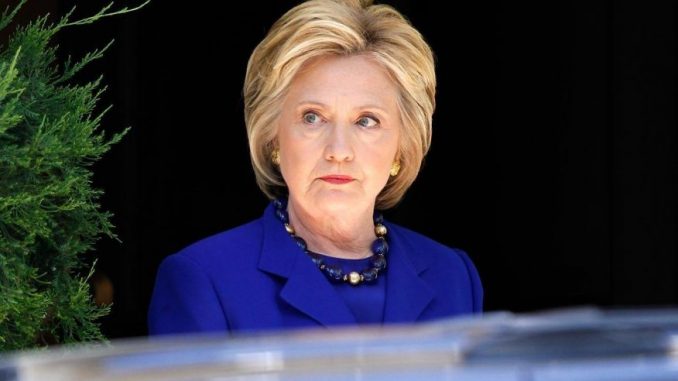
The Justice Department are looking into claims made by House Republicans that Hillary Clinton committed perjury during her 2015 congressional testimony when she outlined her email practises.
House Republicans say that there are major discrepancies between Hillary’s 2015 congressional testimony about her email server and the FBI’s conclusions announced this July.

BYPASS THE CENSORS
Sign up to get unfiltered news delivered straight to your inbox.
You can unsubscribe any time. By subscribing you agree to our Terms of Use
Latest Video
Foxnews.com reports:
“The four pieces of sworn testimony by Secretary Clinton described herein are incompatible with the FBI’s findings,” House Oversight Committee Chairman Jason Chaffetz, R-Utah, and Judiciary Committee Chairman Bob Goodlatte, R-Va., wrote to U.S. Attorney Channing D. Phillips. “We hope this information is helpful to your office’s consideration of our referral.”
The Justice Department Assistant Attorney General for Legislative Affairs, Peter Kadzik, confirmed in an Aug. 2 letter to both committees they had the perjury investigation request and the department would “take appropriate action as necessary.”
The one-page response offered no timeline nor specific commitment to act on the allegations.
According to the Justice Department website, Kadzik, “led the successful effort to confirm Attorney General Loretta E. Lynch and Deputy Attorney General Sally Q. Yates.” Both women were central players handling the Clinton email matter.
Chaffetz and Goodlatte, who have direct oversight for the FBI, wrote to the U.S. attorney that Clinton testified under oath on Oct. 22, 2015, before the Benghazi Select Committee, where she also took questions about her email practices from Republican congressman Jim Jordan of Ohio.
“Secretary Clinton stated ‘there was nothing marked classified on my emails, either sent or received,” the letter states. However, FBI Director James Comey said July 5 that a “very small number of the emails containing classified information bore the markings indicating the presence of classified information.” At least three emails had a (C) for Confidential which is the lowest level of classification. Fox News first reported in June that classified markings existed, despite Clinton’s public claims.
The letter continued, “Contrary to her sworn testimony, Secretary Clinton’s lawyers did not read each email in her personal account to identify all the work related messages.”
Clinton told Jordan that her team “went through every single email.” The FBI Director said his investigators found that Clinton’s lawyers did not read all the emails, and relied on a narrow set of search terms to identify which emails were work-related.
“The lawyers doing the sorting for Secretary Clinton in 2014 did not individually read the content of all her e-emails,” Comey said July 5. Instead, they “relied on header information and used search terms.”
Clinton also testified to Congress there was only one server.
But the FBI Director said investigators found “Clinton used several different servers and administrators of those servers during her four years at the State Department and used numerous mobile devices to review and send e-mail on that personal domain.”
The congressmen emphasized that while Clinton told Congress, and the public, she turned over all her work-related emails, the FBI found otherwise.
“I provided you, with all my work related emails, all that I had. Approximately 55,000 pages. And they are being publicly released,” Clinton testified. But FBI investigators found “several thousand work related emails that were not in the group of 30,000 that were returned by Secretary Clinton to State in 2014.”
In the course of its investigation, the FBI recovered most but not all of the deleted records. The search included “the laborious review of the millions of email fragments dumped into the slack space of the server decomissioned in 2013.”
A retired assistant FBI director, and 28-year-veteran of the bureau, said a perjury review is generally straightforward for agents.
“They look at the transcript of the testimony they provided in light of what they know to be, suspect to be the truth. They investigate both sides and take the aggregate and turn it over to the prosecuting authority for a decision,” Steven Pomerantz said.
“Since the Director (Comey) already established what she (Clinton) said and the investigation is complete, it would be a relatively simple matter to make a decision about perjury… given the history of this, it’s hard to say – it would seem to me a matter of weeks not months in this case.”
A violation of 18 USC 1621 can lead to a fine, imprisonment up to five years, or both though legal experts said the crux of the case will rely on showing intent.
When Comey testified July 7, Clinton’s campaign said some of his statements vindicated the candidate’s public statements.
“In his testimony today, Comey has reconciled most every apparent contradiction between his remarks Tuesday and Clinton’s public statements,” Clinton spokesman Brian Fallon said on Twitter.


